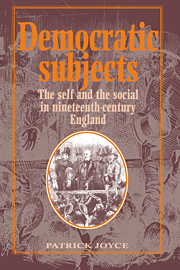Book contents
- Frontmatter
- Contents
- List of plates
- Acknowledgements
- Introduction
- Part One The sorrows of Edwin Waugh: a study in ‘working-class’ identity
- Part Two John Bright and the English people: a study in ‘middle-class’ identity
- Part Three Democratic romances: narrative as collective identity in nineteenth-century England
- Appendices
- Index
Part Three - Democratic romances: narrative as collective identity in nineteenth-century England
Published online by Cambridge University Press: 10 December 2009
- Frontmatter
- Contents
- List of plates
- Acknowledgements
- Introduction
- Part One The sorrows of Edwin Waugh: a study in ‘working-class’ identity
- Part Two John Bright and the English people: a study in ‘middle-class’ identity
- Part Three Democratic romances: narrative as collective identity in nineteenth-century England
- Appendices
- Index
Summary
Who are the people? … the people implies everyone and no one particular group. Michelet was right: no one (personne) made the Revolution. So le peuple is a metaphor, a metaphor for reference, for the social referent itself. Though a metaphor, it still exists. It circulates in and out of social class, professional and political groups, in and out of official and unofficial power, both the innermost self and the common whole. It gives justification and identity to all the above, itself without a shape or name. But everything in which it circulates, contradictory and warring, gives it back the effect of a most physical shape, something thick and consistent, with adamantine desire and a will.
(Linda Orr, Headless History, 1990)‘Is it nothing’, said Mr Roscoe, ‘that science has opened our eyes to the magnificent works of creation? … Is it nothing that she has opened to our contemplation the wonderful system of the moral world? Has analyzed and explained to us the qualities of our own intellect? Refined the proper boundaries of human knowledge? Investigated and ascertained the rules of moral conduct, and the duties and obligations of society? Whatever is wise, beneficent, or useful in government, in jurisprudence, in political economy, is the result of her constant and indefatigable exertions …’
(James Heywood, Manchester Athenaeum, 11 January 1836)- Type
- Chapter
- Information
- Democratic SubjectsThe Self and the Social in Nineteenth-Century England, pp. 147 - 152Publisher: Cambridge University PressPrint publication year: 1994



